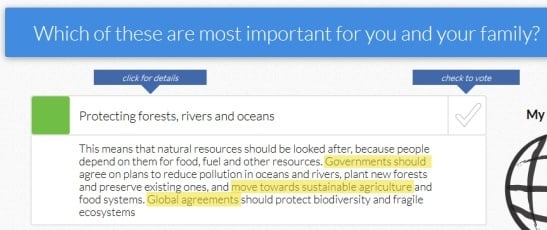A UN survey of public priorities reveals some disturbing assumptions.
Over at The View From Here, Hilary Ostrov tells us about an online survey sponsored by the United Nations. Members of the public are invited to indicate which six out of 16 listed issues are most important to them and their families.
Ostrov reports that, after she completed the survey, the results indicate that climate change ranks dead last with nearly 622,000 votes already cast. Apparently, people are profoundly more concerned about education, health care, honest government, jobs, and clean water.
This can’t be good news to all the UN bigwigs who’ve spent the past several years insisting that climate change is the world’s most urgent problem.
As Ostrov notes, each option listed in the survey is accompanied by a short explanation (accessed with a click of your mouse). You can’t just vote for “Reliable energy at home.” According to the accompanying explanation, this will be interpreted as also expressing support for the statement that: “More of that energy should be sustainably generated.”
If you say that protecting “forests, rivers and oceans” is important to you, the UN will assume that you think governments should “move towards sustainable agriculture” and that you support the signing of global agreements that “protect biodiversity and fragile ecosystems.”
This is classic UN behaviour. Again and again, these people decide what action/solution they themselves prefer. That’s their starting point. Then they work backwards – building arguments and finding/manufacturing evidence that allegedly supports their position.
Thus, at the UN Earth Summit in 1992, 154 nations signed onto the idea that human-generated greenhouse gas emissions were dangerous – and that an international emissions reduction treaty was required to control them.
There’s nothing mysterious about what UN personnel wanted – they were interested in administering an international agreement that would expand their own prestige, authority, scope, and funding possibilities. Virtually everything we humans do generates CO2. Those involved in monitoring and regulating everything we do would be powerful people, indeed.
It’s important to understand that no hard science supported the human-emissions-are-dangerous claim. Climate change research was scandalously immature two decades ago. But that didn’t matter. Start with the goal, and build the argument later.
Ever since, it has been the job of the UN’s Intergovernmental Panel on Climate Change not to investigate climate change impartially, but to find/manufacture evidence to support the pre-determined UN view regarding human-generated greenhouse gases (see here).
This survey demonstrates exactly the same mindset at work. The UN administers an international biodiversity treaty. Thus, in the UN brain, anyone who votes for clean rivers and healthy forests is, defacto, expressing support for this treaty.
It never occurs to these people that I might cherish pristine wilderness and yet regard the UN as a bloated, unaccountable organization whose mandate needs to shrink rather than expand.
Which points to an even more fundamental assumption on the part of the UN: that the average person actually considers it a useful institution.
Personally, I’d be far more interested in a survey in which the UN itself was the topic of conversation. Out of 16 possible issues which ones should the UN itself be paying attention to? What do we, the public, think the UN should be spending its time on?
I could be totally wrong, but my prediction is that most people regard the UN as a useful forum at which national governments can talk through their differences and resolve them peacefully. I suspect most people would agree that the UN has a role to play with respect to refugees, child malnutrition, and responses to natural disasters.
I predict significantly less public support, however, for UN reports that tell us we should combat world hunger by eating insects. I also imagine that many people share my skepticism that droughts (which have always existed, and which are necessarily regional rather than global) should be a UN concern.
The UN is a bureaucracy. It is the nature of bureaucracies to constantly expand their reach. This is normal and predictable.
It is the job of the public to keep bureaucracies in check – to prevent them from turning into many-tentacled monsters that meddle in places they don’t belong.
read Hilary Ostrov’s blog post here
see the UN survey here






